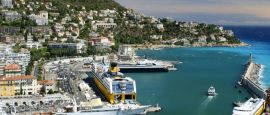Nice History
The Nice area is thought to be home to one of the earliest human settlements in Europe, given the evidence of prehistoric man found at the nearby archaeology site of Terra Amata. The city proper has its roots in a Greek city called Nikaia in the 4th century BC, before the Romans built a rival adjacent town called Cemenelum.
In the centuries following, Nice was subject to many different invaders, including Barbarians, Ligurians and Saracens, all of whom coveted the city’s strategic position on the Mediterranean. Seeking stability, the Nicoise placed themselves under the protection of the House of Savoy in 1388, which came to control most of the Italian Peninsula. Yet instead of stability, Nice spent the ensuing centuries buffeting between French and Italian hands.
In 1860, the city finally landed in French control, despite being the birthplace of the fabled Italian liberator, Giuseppe Garibaldi. In the years that followed, Nice became a trendy destination for the bourgeois, especially wealthy English visitors who built grand houses and developed the main seafront esplanade – hence why it’s called the Promenade des Anglais.
After centuries of turmoil, Nice became the ultimate tourist destination in the 19th century. The Regina Hotel in Cimiez was built especially for her majesty Queen Victoria, a regular visitor. These were the halcyon days of the Belle Epoque.
The city emerged relatively unscathed from both World Wars in the 20th century, but the splendour of the Belle Epoque had faded. Nice was no longer exclusive to royalty and nobles. Rather unfairly, the writer Somerset Maugham described the Cote d’Azure’s new visitors as ‘shady people’.
Since then, Nice has continued to grow in both size and popularity. Today, it is France’s fifth largest city and remains one of the biggest draws for foreign tourists visiting the country.
Did you know?
• The Nice area’s early human ancestors ventured here some 400,000 years ago.
• It’s popularly said that the great leader of Italian unification, Garibaldi, was so upset by Nice passing under French control in 1860 that his statue in the city’s Place Garibaldi points towards Italy. It actually points north, to both Italy and France.
• The city’s name comes from the Greek Nike, meaning victory, and was called such to celebrate the Greeks’ victory over the Ligurians.
Do you have any Feedback about this page?
© 2026 Columbus Travel Media Ltd. All rights reserved. No part of this site may be reproduced without our written permission, click here for information on Columbus Content Solutions.




 You know where
You know where